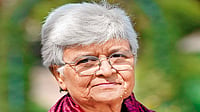This year is about to transition into another one but not without giving the best of its harvests. Annie Ernaux, a French feminist writer, who made her life the material of her writing, won the most coveted literary award, the Nobel Prize. Her writing may appear autobiographical, but she claims it is fiction that she writes. She is the first French woman writer to receive the prize, but not the only feminist to value her body so much as to write from it.
Hélène Cixous, another French feminist writer and theorist, asked women to write from their bodies as it can liberate them from its patriarchal definition and subjugation. Writing is liberating for women in the sense that they can express themselves from the closest quarters of their being, a trove of enormous wealth, access to which they are denied. Cixous writes, “To write. An act which will not only ‘realize’ the decensored relations of women to her sexuality, to her womanly being, giving her access to her native strength, it will give her back her goods, her pleasures, her organs, her immense bodily territories which have been kept under seal” (The Laugh of the Medusa). Ernaux, too, wrote her novels by utilising her body, which went through numerous experiences not only of love but also of abortion, social inequality and poverty.
The female body is deep enough to preserve all such memories in their simplicity and honesty. This year Geetanjali Shree, a Hindi fiction writer, won the International Booker Prize for her novel, Ret Samadhi, centred around a female protagonist who leaves the patriarchal comfort zone of her being—home, family and children—for a past love that is territorially located outside her nation. This novel defies the symbolic order which defines women, their bodies, love and sexuality. The nation itself becomes the metaphor for the incarceration and confinement of women’s inner selves. It is another body within which she has to live quite strangely.
This is also the year that Hans magazine is celebrating the writings of Rajendra Yadav, one of its most celebrated editors, and his commitment to women’s liberation or, to put it more mildly, freedom, by organising a three-day conference in Yadav’s honour in October in Delhi. A number of noted women writers and activists from different walks of life participated to discuss and debate the contemporary form of feminist writings and discourse in India, particularly in Hindi literature.
There is a divide between women writers as well, between those who speak against patriarchy and those who write without challenging the structures and instruments of patriarchy. Love, sex and power are issues that confront women’s minds and writing today as never before. They are also on the agenda of discussion and debate at the celebratory conference. India is changing. There is bound to be a conservative trend that will advocate saving what is beyond redemption.
Yadav would have enjoyed these discussions more than anyone else. In fact, he used to raise issues of this nature quite provocatively from time to time in his discussions with other progressive writers. Apart from being an important fiction writer, a part of the literary movement of the ‘Nayi Kahani’ in Hindi, he wrote remarkable short and long stories dealing with the impact of modernity on Indian society, Yadav recognised the necessity of its deepening values of freedom and equality. This inspired him to do some sociological writings as well. His books, Ukhde Hue Log, Sara Akash and Ek Inch Muskan (co-authored with Mannu Bhandari) are considered classics in Hindi literature. Later on, he began reflecting on building a parallel world (‘samananter duniya’) just as most committed writers do as they find the existing one unbearable, a world more equal and just in its values. It is obvious that he would reflect on caste and women’s issues that plague India.

It is with this kind of conviction that he focused more and more on women’s liberation, the liberation of their bodies from the feudal and semi-modern structures of patriarchy. He too believed, like Cixous and Ernaux, that it can be accomplished through women’s writings. He chose Hans, which he bought from Premchand’s son Amrit Rai in 1986, as the medium through which a campaign of this nature could be run. No wonder Hans became a platform for women’s writing, unlike any other magazine of that time. It launched many renowned women writers. It had Krishna Sobti, Mannu Bhandari and Prabha Khetan writing for it. Many senior writers, such as Usha Priyamvada, Mridula Garg, Sudha Arora, Chitra Mudgal, Maitreyi Pushpa, Madhu Kankaria, Rohini Agrawal, Geetanjali Shree, Anamika and Tasleema Nasreen, who continue to write for Hans, are established names in Hindi literature. There is a host of younger generation of women writers coming from smaller towns, like Manisha Kulshreshtha, Kavita, Neelakshi Singh, Pratyaksha, Geeta Shree, Saryu Sharma, Akanksha Pare and Yogita Yadav, to name a few, who are writing in Hans. The new editorial team continues to support women writers and does not shy away from facing the challenges of feminist writing in the era of postmodernism and postcolonialism. Many women are now writing from the Dalit and Adivasi perspectives, and intersectionality is the theoretical bridge that all of us are crossing together right now.
The discourse of feminism has moved from the body to language and sexuality, and writings are focused on new challenges. It is clear that women’s freedom confined to the body is far more complicated in the late capitalist system of production and reproduction than thought earlier by Rajendra Yadav and many others of the radical feminist era. The body houses the freest and cheapest labour available in the market and it cannot be freed either by the market or by the state as a matter of will or desire of women. Also, women’s writing cannot be liberating if women do not have their own language. The struggle is to change the Symbolic order, to form sentences through a feminist semiotics and make words will acquire new meanings to reproduce women as their own sovereign selves, as writers or for that matter anything else, even idle dreamers.
So much depends on how we frame the women’s question today, how we evaluate the contributions made by people who gave us a point of departure and what we make of it. One is sure that writing has not accomplished its goals yet, with women and other genders still struggling to find a moment of self-reflection and assess what needs to be done.
This reflection will be critical and anyone supporting patriarchal institutions and their structures, like family, marriage, caste or market in its present form, will be considered as co-producing it. One will have to struggle against the most intimate structures and people we know. When we wish to change an oppressive system, the fight is incredibly intimate and difficult.
(This appeared in the print edition as "Intimate Enemies")
(Views expressed are personal)
Savita Singh is a Hindi poet and academic






















